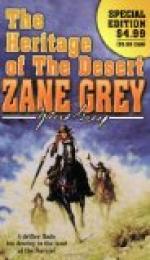So the crossing of the Navajos proceeded, never an instant free from danger in that churning current. The mustangs and ponies floundered somewhat on the sand-bar and then parted the willows and appeared on a trail skirting the red wall. Dave Naab moored his boat on that side of the river, and returned with George.
“We’ll look over my farm,” said August, as they retraced their steps. He led Hare through fields of alfalfa, in all stages of growth, explaining that it yielded six crops a year. Into one ten-acre lot pigs and cows had been turned to feed at will. Everywhere the ground was soggy; little streams of water trickled down ditches. Next to the fields was an orchard, where cherries were ripe, apricots already large, plum-trees shedding their blossoms, and apple-trees just opening into bloom. Naab explained that the products of his oasis were abnormal; the ground was exceedingly rich and could be kept always wet; the reflection of the sun from the walls robbed even winter of any rigor, and the spring, summer, and autumn were tropical. He pointed to grape-vines as large as a man’s thigh and told of bunches of grapes four feet long; he showed sprouting plants on which watermelons and pumpkins would grow so large that one man could not lift them; he told of one pumpkin that held a record of taking two men to roll it.
“I can raise any kind of fruit in such abundance that it can’t be used. My garden is prodigal. But we get little benefit, except for our own use, for we cannot transport things across the desert.”
The water which was the prime factor in all this richness came from a small stream which Naab, by making a dam and tunnelling a corner of cliff, had diverted from its natural course into his oasis.
Between the fence and the red wall there was a wide bare plain which stretched to the house. At its farthest end was a green enclosure, which Hare recognized as the cemetery mentioned by Snap. Hare counted thirty graves, a few with crude monuments of stone, the others marked by wooden head-pieces.
“I’ve the reputation of doctoring the women, and letting the men die,” said Naab, with a smile. “I hardly think it’s fair. But the fact is no women are buried here. Some graves are of men I fished out of the river; others of those who drifted here, and who were killed or died keeping their secrets. I’ve numbered those unknown graves and have kept a description of the men, so, if the chance ever comes, I may tell some one where a father or brother lies buried. Five sons of mine, not one of whom died a natural death, found graves here—God rest them! Here’s the grave of Mescal’s father, a Spaniard. He was an adventurer. I helped him over in Nevada when he was ill; he came here with me, got well, and lived nine years, and he died without speaking one word of himself or telling his name.”
“What strange ends men come to!” mused Hare. Well, a grave was a grave, wherever it lay. He wondered if he would come to rest in that quiet nook, with its steady light, its simple dignity of bare plain graves fitting the brevity of life, the littleness of man.




